UN at COP28 UAE
What is a ‘COP’?
UN climate conferences are government-level large-scale annual gatherings focused on climate action. They are also referred to as COPs – Conference of the Parties to the UN Framework Convention on Climate Change (UNFCCC).
The UNFCCC convention entered into force on 21 March 1994 to prevent “dangerous” human interference with the climate system.
Today, ratified by 198 countries, it has near-universal membership. The Paris Agreement, adopted in 2015, works as an extension of that convention.
Over 60,000 people are expected to attend COP28, including delegates from member states of the UNFCCC, industry leaders, youth activists, representatives of indigenous communities, journalists, and other stakeholders.
It is a critical moment for global climate action.
COP28 will provide us with a reality check – a culmination of a process called ”Global Stocktake” – on how far the world has come in tackling the climate crisis and how much of a course correction is needed.
Why is the COP28 conference important?
Since the adoption of the Paris Agreement on climate change at COP21 in 2015, subsequent conferences have revolved around implementing its key goal: halt global average temperature rise to well below 2°C and pursue efforts to limit the rise to 1.5°C above pre-industrial levels.
If Paris gave us the agreement, Katowice (COP24) and Glasgow (COP26) showed us the plan. Sharm el-Sheikh (COP27) then shifted us to implementation.
Now, COP28 is expected to be a turning point, where countries not only agree ‘WHAT’ stronger climate actions will be taken, but show ‘HOW’ to deliver them.
Measuring the progress towards achieving the Paris goals on mitigation, adaptation and climate finance and adapting existing plans is a key part of the puzzle, and this is why COP28 assumes more significance.
The first global stocktake, which began at COP26 in Glasgow, will conclude in Dubai.
The process is designed to help identify what more still needs to be done and guide countries towards more ambitious and accelerated climate action plans.
So, the decision adopted by the parties at COP28 could emerge as the most consequential outcome following the 2015 Paris conference.
What is at stake?
Quite literally, the health of our planet and humanity’s well-being.
“Antarctica has been called the sleeping giant, but it is now being awoken by climate chaos,” UN Secretary General António Guterres warned during his visit there ahead of COP28.
Antarctic sea ice is at an all-time low. New figures show that this September, it was 1.5 million square kilometers smaller than the average for the time of year – “an area roughly the size of Portugal, Spain, France and Germany combined”.
“All of this spells catastrophe around the world,” he said. “What happens in Antarctica doesn’t stay in Antarctica. And what happens thousands of miles away has a direct impact right here.”
Over a century of fossil fuels burning and unsustainable energy and land use has already led to a global warming of 1.1°C above pre-industrial levels. Every increment of warming is likely to exacerbate the intensity and frequency of extreme weather events such as heatwaves, flooding, storms and irreversible climate changes.
2023 is on track to be the hottest year, while the past eight years were the eight warmest on record globally, fueled by increasing greenhouse gas concentrations and accumulated heat.
Mr. Guterres has sounded the alarm on several occasions with the warning that if nothing changes, we are heading towards a 3°C temperature rise – towards a dangerous and unstable world.
“Humanity has opened the gates of hell. Horrendous heat is having horrendous effect,” he said.
Almost half of the world’s population lives in regions highly vulnerable to climate change.
The least developed, landlocked and small island countries may have contributed little to this crisis, but they are the ones on the frontlines, having to deal with its deadly consequences.
What do we mean by stronger climate action?
The UN Secretary-General has repeatedly sent stark reminders that the current urgency for climate action is dwarfed by the scale of the crisis, but the “future is not fixed”.
The science is clear: it is still possible to limit temperature rise to 1.5°C and avoid the worst of climate change, “but only with dramatic, immediate climate action”, which includes:
- A 45 per cent reduction in greenhouse gas emissions by 2030 compared to 2010 levels
- Achieving global net zero emissions by 2050
- A “just and equitable transition” from fossil fuels (oil and gas) to renewable energy sources
- Increased investments in adaptation and resilience to the climate disruption
But, there is more – such as fulfilling the financial commitments in support of developing countries, securing $100 billion in climate finance annually and operationalizing the loss and damage fund, which was agreed upon last year at COP27, delivering climate justice.
However, the UNFCCC’s nationally determined contributions (NDCs) synthesis report released in November shows that the world is failing to get a grip on the climate crisis.
“Global ambition stagnated over the past year and national climate plans are strikingly misaligned with the science,” the UN chief said.
How will COP28 contribute to the global fight against climate change?
Almost eight years after the Paris Agreement and half-way through the 2030 Agenda, COP28 is a timely opportunity to embark upon a new path towards effective climate action.
As several UN reports show, the world is not on track to meeting the Paris Agreement’s goals, but the hope is that governments at COP28 will lay out a roadmap to accelerate climate action.
In 2020, individual countries came up with national climate action plans aimed at reducing national emissions and adapting to climate change impacts.
With the next round of these plans scheduled for 2025, the outcome of the global stocktake process could encourage countries to raise ambition and set new targets, exceeding existing policies and commitments.
With so much at stake, the Dubai conference is a decisive moment to turn climate plans into ambitious action and turn the tide against the climate crisis.
This article first appeared in UN News.
The UN Resident Coordinator's Office for the UAE (UN RCO) played an important role in facilitating and coordinating UN engagement at COP28, focusing in operational support, communications, public outreach and event coordination.
The RCO's distinguished contribution at COP28 includes the coordination and engagement in a total of 35 events, with 17 held in the Green Zone and 18 in the Blue Zone at Expo City Dubai. This testament underscores the commitment to advancing the discourse on climate-related issues and fostering global collaboration for a sustainable future for all.
UN UAE's Engagements at COP28's Green Zone:
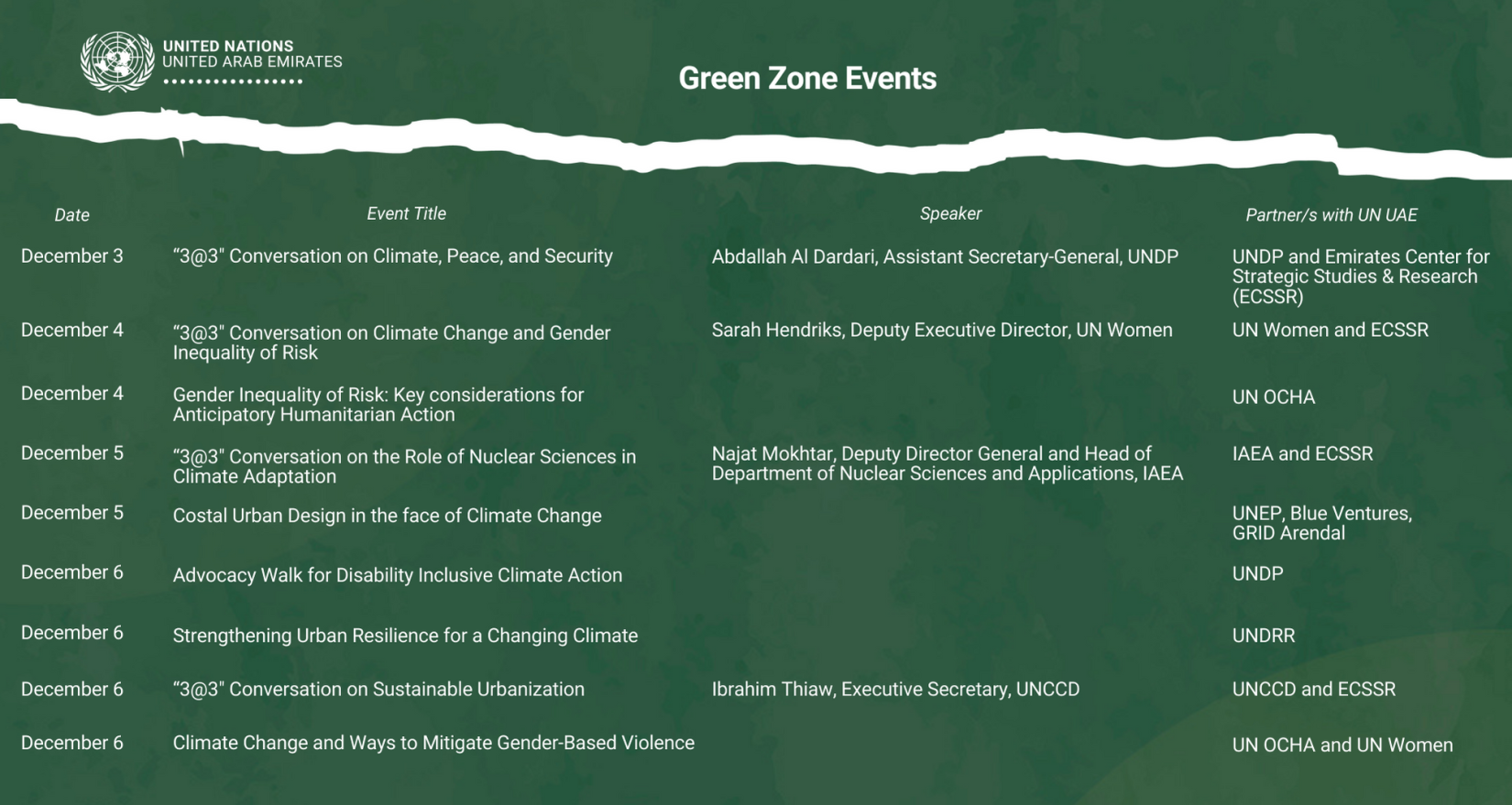
What is the COP28 Green Zone? The Green Zone is a space designed to engage the broader public. NGOs, businesses, and diverse stakeholders are welcome to visit, making it a hub for innovation, collaboration, and showcasing solutions to climate-related issues.
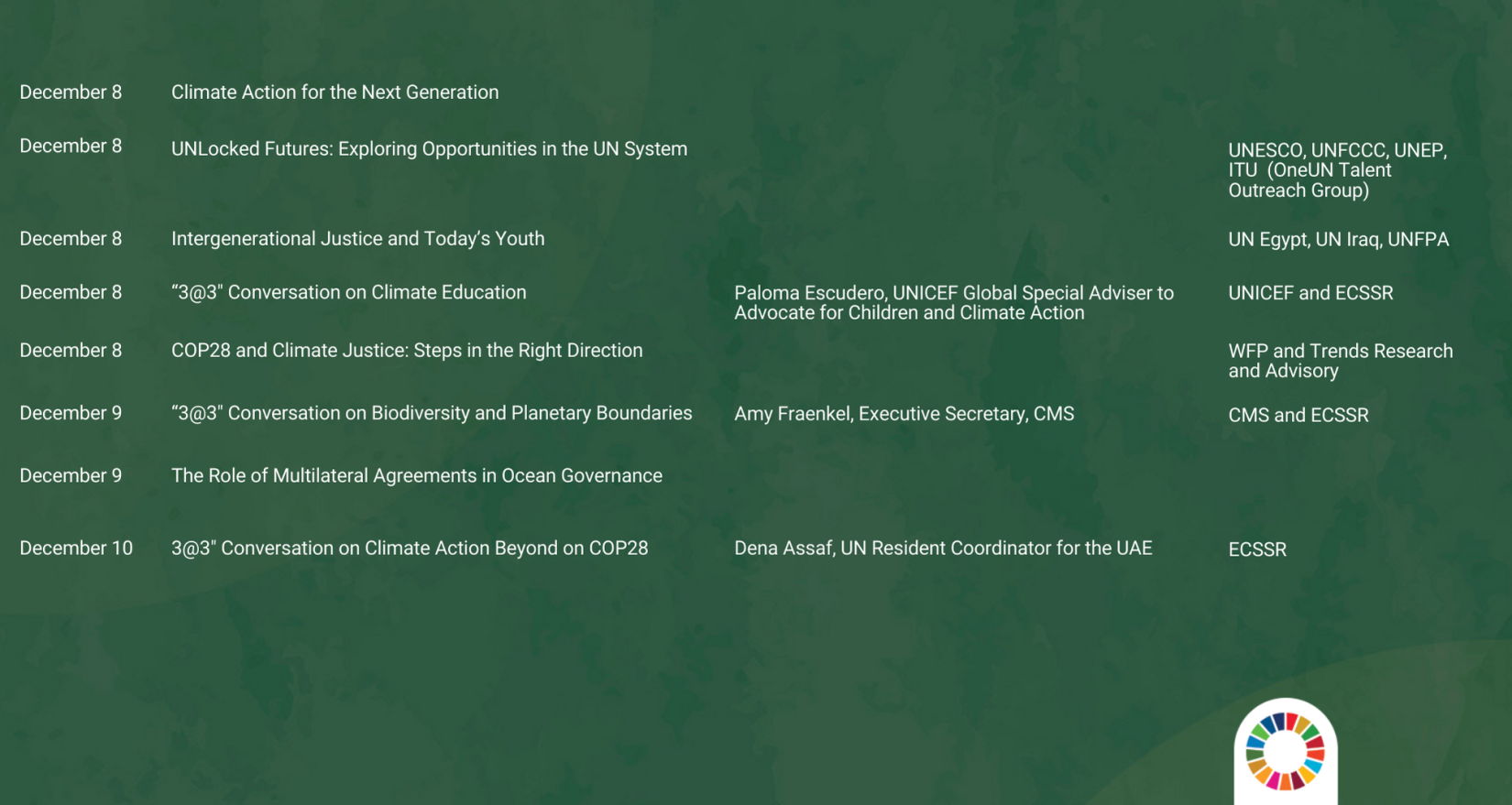
UN UAE's Engagements at COP28's Blue Zone:
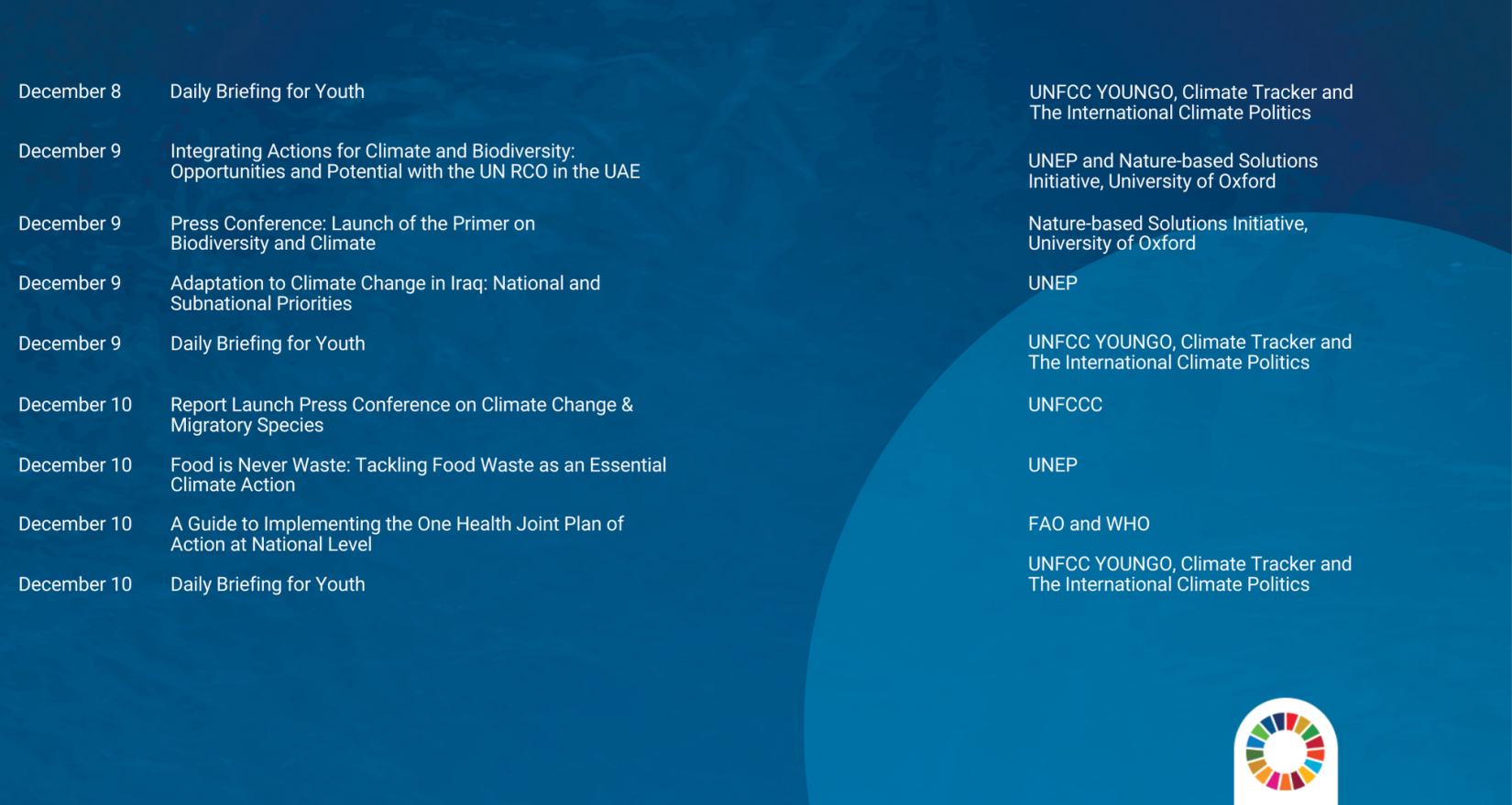
What is the COP28 Green Zone? The Blue Zone at COP28 in the UAE is overseen by the UNFCCC and functions as the central hub for official negotiations and high-level meetings. Exclusive to accredited participants, including government representatives, negotiators, observers, and accredited media, it serves as the focal point for international climate policy decisions and agreements.
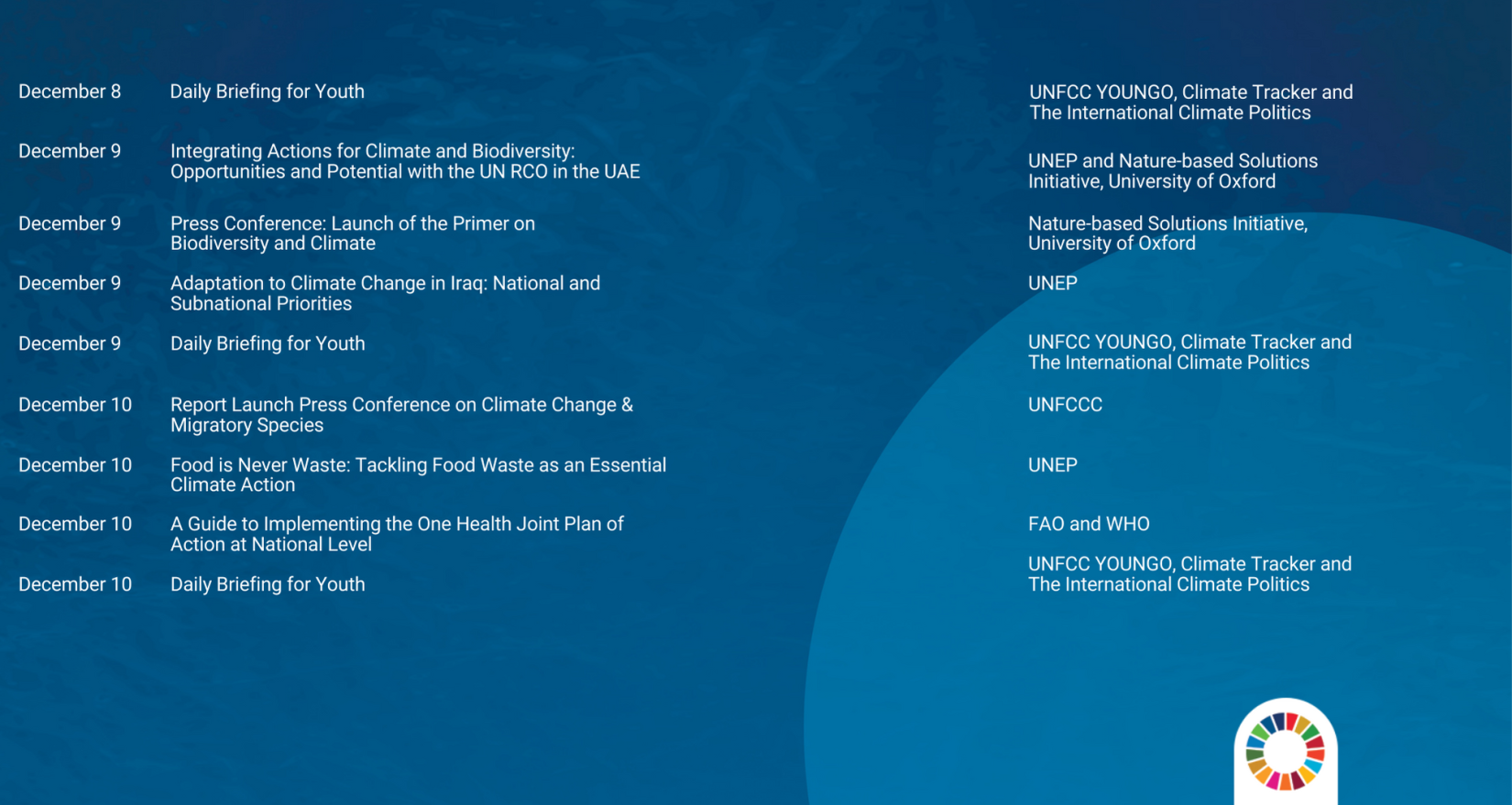
COP28 ends with call to ‘transition away’ from fossil fuels; UN’s Guterres says phaseout is inevitable.
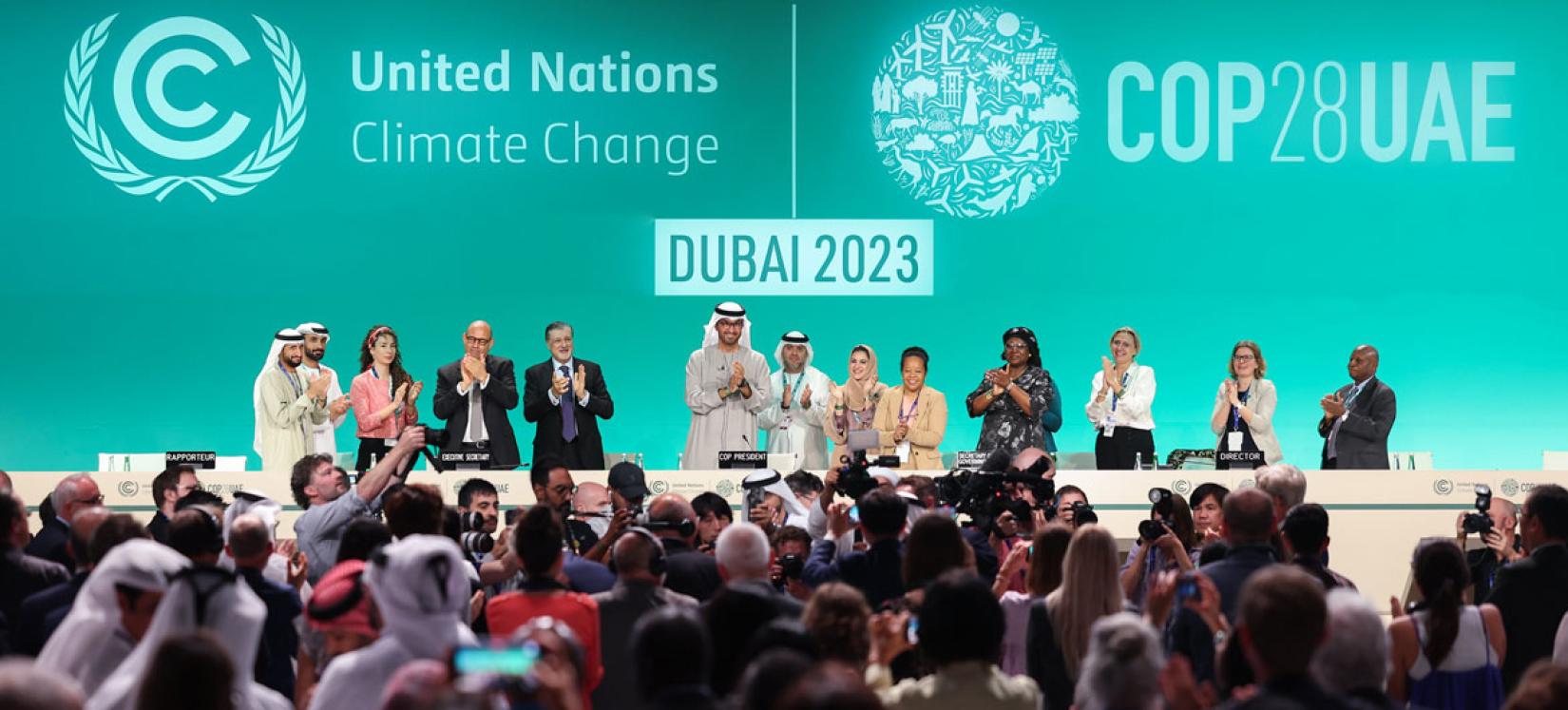
13 December 2023
Nations at COP28 in Dubai approved earlier on Wednesday a roadmap for “transitioning away from fossil fuels” – a first for a UN climate conference – but the deal still stopped short of a long-demanded call for a “phaseout” of oil, coal and gas.
Reacting to the adoption of the outcome document, UN chief António Guterres said that mention of the world’s leading contributor to climate change comes after many years in which the discussion of this issue was blocked.
He stressed that the era of fossil fuels must end with justice and equity.
“To those who opposed a clear reference to a phaseout of fossil fuels in the COP28 text, I want to say that a fossil fuel phase out is inevitable whether they like it or not. Let’s hope it doesn’t come too late,” added the Secretary-General.
The latest edition of the annual UN climate conference has been running in Dubai, the largest city in the United Arab Emirates, since 30 November.
COP28 had been scheduled to close on Tuesday, but intense overnight negotiations on whether the outcome would include a call to “phase down” or “phase out” planet heating fossil fuels like oil, gas and coal forced the conference into overtime.
This is the main sticking point that pit activists and climate-vulnerable countries against some larger nations for much of past two weeks.
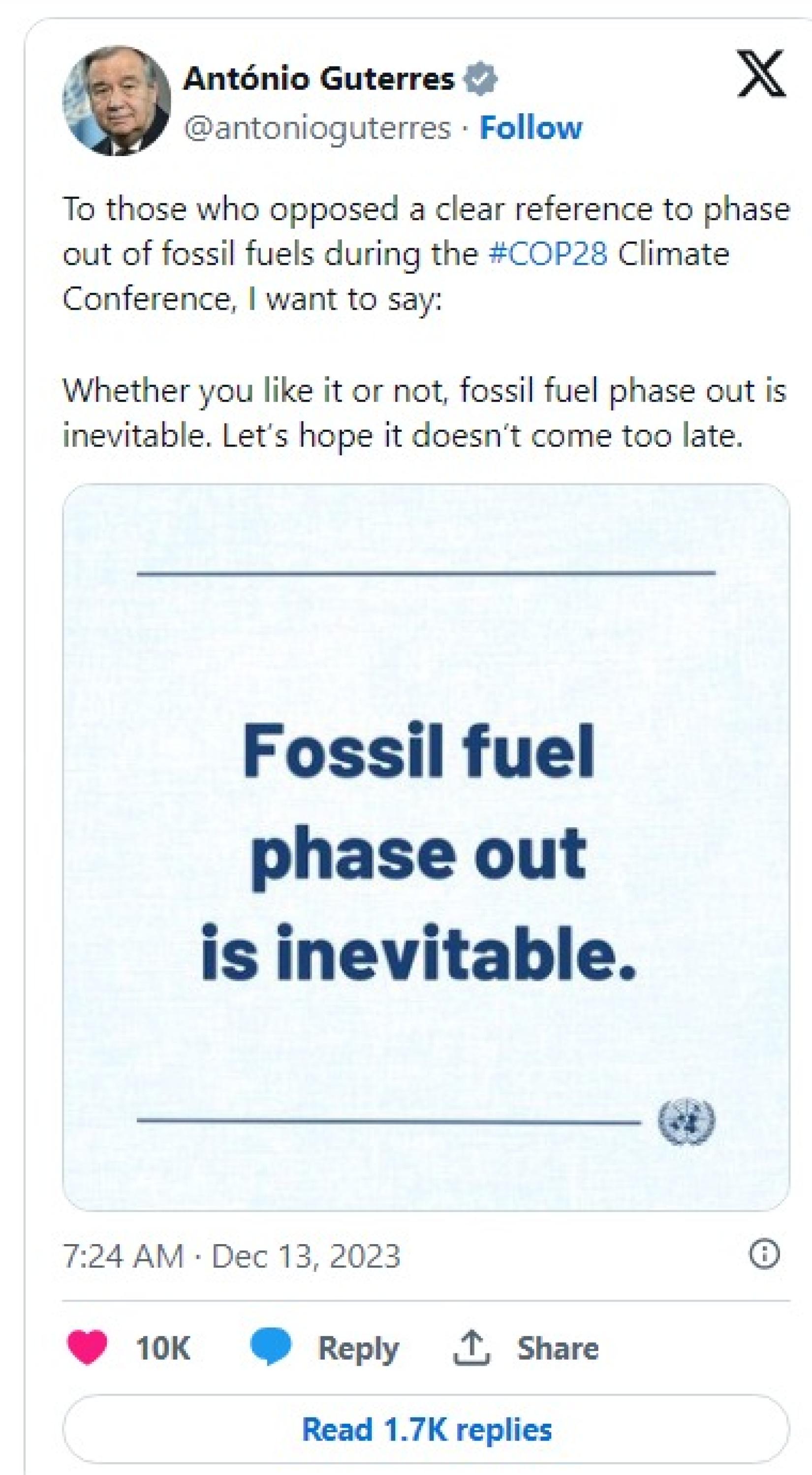
‘The science is clear’
In his statement, Mr. Guterres said limiting global heating to 1.5°C, one of the keystone targets set in the landmark 2015 the Paris Agreement, “will be impossible without the phase out of all fossil fuels”, and this is being recognized by a growing and diverse coalition of countries.
The negotiators at COP28 also agreed on commitments to triple renewables capacity and double energy efficiency by 2030 and made progress in relation to adaptation and finance.
Other progress was also made in relation to adaptation and finance, including – including the operationalization of the Loss and Damage Fund, even though financial commitments are very limited, according to the Secretary-General.
But the UN chief stressed that much more is needed to deliver climate justice to those on the frontlines of the crisis.
“Many vulnerable countries are drowning in debt and at risk of drowning in rising seas. It is time for a surge in finance, including for adaptation, loss and damage and reform of the international financial architecture.”
He said the world cannot afford “delays, indecision, or half measures” and insisted that “multilateralism remains humanity’s best hope.”
“It is essential to come together around real, practical and meaningful climate solutions that match the scale of the climate crisis.”
‘A lifeline, not a finish line’
UN climate chief Simon Stiell said, “genuine strides forward” were made at COP28, but the initiatives announced in Dubai are “a climate action lifeline, not a finish line.”
Mr. Stiel said the Global Stocktake – which aims to help nations align their national climate plans with the Paris Agreement – had clearly revealed that progress is not fast enough, but it is “undeniably” gathering pace.
Still, the current trajectory is just under three degrees of global warming equating “mass human suffering”, according to the climate chief, which is why COP28 “needed to move the needle further”.
Speaking to reporters outside the main hall, Mr. Stiell said COP28 needed to signal a hard stop to humanity’s core climate problem – “fossil fuels and their planet burning pollution”.
“While we didn't fully turn the page on the fossil fuel here in Dubai, this is clearly the beginning of the end”.
“This agreement is an ambitious floor, not a ceiling. So, the crucial years ahead must keep ramping up ambition and climate action,” said Mr. Stiell, who is the Executive Secretary of the UN climate convention, the framework that facilitates the COP, or conference of Parties, process.
Here are some of the other highlights from COP28 and a snapshot of what happens next:
What happened at COP28?
- The loss and damage fund designed to support climate-vulnerable developing countries was brought to life on the first day of the COP. Countries have pledged hundreds of millions of dollars so far for the fund;
- Commitments of worth $3.5 billion to replenish the resources of the Green Climate Fund;
- New announcements totaling over $150 million for the Least Developed Countries Fund (LDC) and Special Climate Change Fund (SCCF)
- An increase of $9 billion annually by the World Bank to finance climate-related projects (2024 and 2025);
- Nearly 120 countries backed COP28 UAE Climate and Health Declaration to accelerate actions to protect people’s health from growing climate impacts;
- Over 130 countries have signed up to COP28 UAE Declaration on Agriculture, Food, and Climate to support food security while combatting climate change; and
- Global Cooling Pledge has been endorsed by 66 countries to reduce cooling related emissions by 68% from today.
What's next?
- The next round of national climate action plans – or Nationally Determined Contributions – is due in 2025, when countries are expected to have seriously boosted their actions and commitments.
- Azerbaijan was announced as the official host COP29 – from November 11 to 22 next year – after receiving the backing of Eastern European states following the withdrawal by Armenia of its own bid.
- Brazil has offered to host COP30 in the Amazon in 2025.
Mixed reactions
Despite multiple rounds of applause inside the plenary, not all delegations were pleased with the outcome of the climate talks. Civil society representatives and climate activists, as well as delegations from small island developing countries were visibly unhappy with the outcome.
Anne Rasmussen, the Samoan representative and lead negotiator for the Alliance of Small Island States (AOSIS), pointed out that the decision was gavelled during their absence in the plenary room as the group was still coordinating its response to the text.
She lamented that the delegations she represents cannot “afford to return to their islands with the message that this process has failed us.”
Underlining the importance of the Global Stocktake process, she said, “this first GST is of particular significance. It is the only GST that matters for ensuring that we can still limit global warming to 1.5C.”
But Ms. Rasmussen bemoaned the ountcome's lack of “course correction” and expressed disappointment over “incremental advancement over business as usual, when what we really needed was an exponential step-change in our actions and support.”

UNFCCC/Kiara Worth
Just after the release of the final document, Harjeet Singh, head of global political strategy at Climate Action Network International told UN News: “After decades of evasion, COP28 finally cast a glaring spotlight on the real culprits of the climate crisis: fossil fuels. A long-overdue direction to move away from coal, oil, and gas has been set.”
But the outcome was "marred by loopholes that offer the fossil fuel industry numerous escape routes, relying on unproven, unsafe technologies.”
Mr. Singh also pointed to what he saw as “hypocrisy of wealthy nations…that continue to expand fossil fuel operations massively while paying mere lip service to the green transition.”
Developing countries still dependent on fossil fuels are, he said, left without robust guarantees for adequate financial support in their “urgent and equitable transition to renewable energy.”
“While this COP recognized the immense financial shortfall in tackling climate impacts, the final outcomes fall disappointingly short of compelling wealthy nations to fulfill their financial responsibilities,” he added.
Want to know more? Check out our special events page, where you can find all our coverage of the COP28 climate conference, including stories and videos, explainers and our newsletter.
This article first appeared in UN News.
During COP28 in UAE, the world convened for the largest climate change conference. UN experts, delegates and partners shed light on areas most affected by climate change and ways to collectively address them.
Climate action can't wait.
The UN Climate Change Conference (COP 28) took place from 30 November to 13 December in Dubai, the United Arab Emirates and marked the conclusion of the first ‘global stocktake’ of the world’s efforts to address climate change under the Paris Agreement. Here's a summary of the conference's key highlights.


















